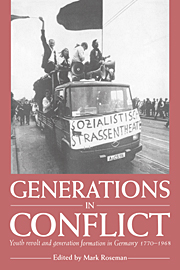Book contents
- Frontmatter
- Contents
- Contributors
- Acknowledgements
- List of abbreviations
- 1 Introduction: generation conflict and German history 1770–1968
- 2 The ideal of youth in late eighteenth-century Germany
- 3 Young Germans and Young Germany: some remarks on the history of German youth in the late eighteenth and in the first half of the nineteenth century
- 4 The battle for the young: mobilising young people in Wilhelmine Germany
- 5 Jewish politics and generational change in Wilhelmine Germany
- 6 The ‘front generation’ and the politics of Weimar Germany
- 7 The New Woman and generation conflict: perceptions of young women's sexual mores in the Weimar Republic
- 8 Generations of German historians: patronage, censorship and the containment of generation conflict 1918–1945
- 9 Gender, generation and politics: young Protestant women in the final years of the Weimar Republic
- 10 The Hitler Youth generation and its role in the two post-war German states
- 11 The BDM generation: a female generation in transition from dictatorship to democracy
- 12 A generation twice betrayed: youth policy in the transition from the Third Reich to the Soviet Zone of Occupation (1945–1946)
- 13 The generation conflict that never was: young labour in the Ruhr mining industry 1945–1957
- 14 The German Kriegskinder: origins and impact of the generation of 1968
- Index
14 - The German Kriegskinder: origins and impact of the generation of 1968
Published online by Cambridge University Press: 19 October 2009
- Frontmatter
- Contents
- Contributors
- Acknowledgements
- List of abbreviations
- 1 Introduction: generation conflict and German history 1770–1968
- 2 The ideal of youth in late eighteenth-century Germany
- 3 Young Germans and Young Germany: some remarks on the history of German youth in the late eighteenth and in the first half of the nineteenth century
- 4 The battle for the young: mobilising young people in Wilhelmine Germany
- 5 Jewish politics and generational change in Wilhelmine Germany
- 6 The ‘front generation’ and the politics of Weimar Germany
- 7 The New Woman and generation conflict: perceptions of young women's sexual mores in the Weimar Republic
- 8 Generations of German historians: patronage, censorship and the containment of generation conflict 1918–1945
- 9 Gender, generation and politics: young Protestant women in the final years of the Weimar Republic
- 10 The Hitler Youth generation and its role in the two post-war German states
- 11 The BDM generation: a female generation in transition from dictatorship to democracy
- 12 A generation twice betrayed: youth policy in the transition from the Third Reich to the Soviet Zone of Occupation (1945–1946)
- 13 The generation conflict that never was: young labour in the Ruhr mining industry 1945–1957
- 14 The German Kriegskinder: origins and impact of the generation of 1968
- Index
Summary
One of the paradoxes of the historical process is that there is no necessary connection between the motives for an action and its outcome. When a new social group or collective actor emerges on to the historical stage, for example, the motives that prompt it to act will rarely suffice to explain its historical impact. Hegel wrote of the ‘transformation’ (Verkekrung) of subjective intentions into objective meaning; sociologists speak of ‘unintended consequences’. The basic principle of historical change is that the meaning of any historical action always extends beyond the purely subjective dimension of those involved.
The discrepancy between motive and outcome applies particularly to the great epoch-making social movements and the fate of the groups which unleashed them. Often the actors' motives derive from a historical situation which is then overturned by the processes they themselves have unleashed. A new order emerges, and those who had helped bring it about find their own actions and identity being seen in a new light and a new social context. The motives of the historical actors stem from one historical-social order; but the evaluation of its impact is carried out in another. This paradoxical relationship presents a particular challenge to the collective identity of the social groups involved. What from their point of view might appear as a failure, may in the context of the historical process they have generated be seen as a success, albeit one which has little to do with the original purpose of those involved.Alternatively, by focusing on the enduring impact of the social movement, its instigators may lose sight of what it was that originally galvanised them to form together and to act.
- Type
- Chapter
- Information
- Generations in ConflictYouth Revolt and Generation Formation in Germany 1770–1968, pp. 290 - 307Publisher: Cambridge University PressPrint publication year: 1995
- 2
- Cited by

